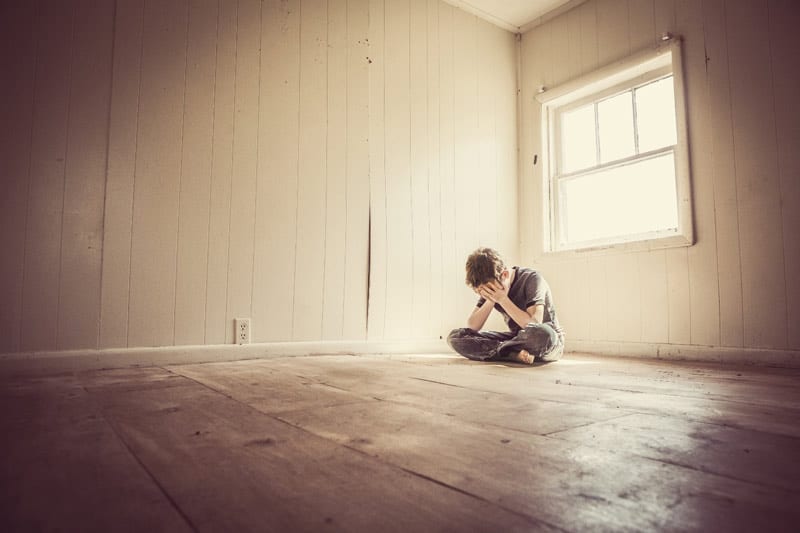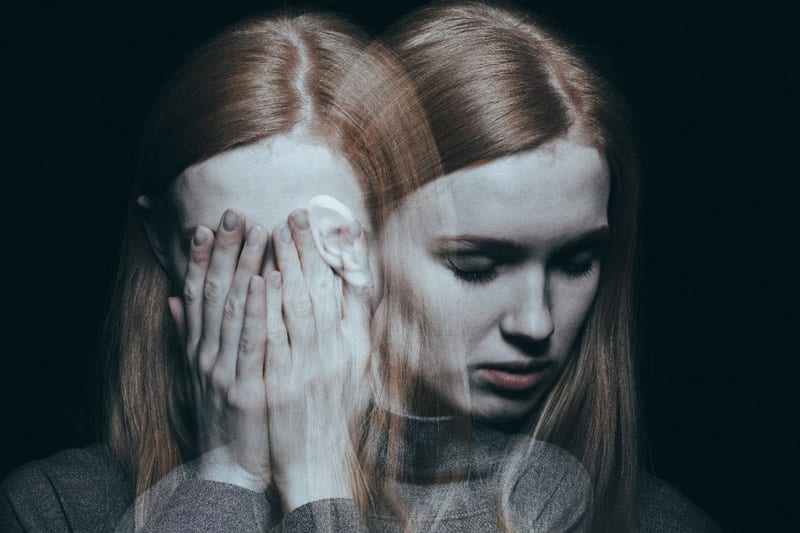What is Bipolar Disorder?
According to a recent study, bipolar disorder affects around 2.3% of the American population, which equates to some six million people who have been diagnosed with this mental health disorder. Symptoms can occur at any age, but bipolar disorder is typically diagnosed at around twenty-five years old and is less common in childhood.
This condition is the fourth most common mental health problem globally after depression, anxiety, and schizophrenia[1]. It is a mood disorder where one experiences symptoms of extreme mood swings, ranging from the highest highs to the lowest lows.
The “highs” of bipolar disorder are known as mania and are in stark contrast to the “lows” of depression in the bipolar emotional cycle. In between these mental peaks and troughs, one might have normal levels of energy and return to a cycle or suffer a mix of both elevated and depressive feelings that occur simultaneously.
As with any mental illness, bipolar disorder can be difficult to diagnose if you’re not familiar with the symptoms; however, there are some specific signs you can look out for.
If you or a person you know exhibits such symptoms, it is recommended to reach out to a medical professional for proper assessment and diagnosis. Additionally, you or someone you know may need medical advice on how to manage anxiety, if it is an accompanying symptom.
7 Signs to Look For
Bipolar disorder can hit people in different ways. It is, to some degree, an internal condition, yet some signs and symptoms could make it more apparent to yourself or others.
1. Decreased need for sleep

2. Restlessness and agitation
Another symptom of bipolar disorder, again associated with the highs of the manic phase, is visible restlessness and agitation, which can involve the inability to sit still, tapping fingers, being easily irritable, or abruptly starting or stopping tasks. For many people diagnosed with bipolar disorder, this agitation will feel like an anxious restlessness that is difficult, if not impossible, to control.
3. Racing thoughts and accelerated speech
Fast-moving and repetitive thoughts that either focus on a single topic or even cut across several different lines of thought at the same time can be a sign of bipolar disorder, especially if it happens frequently and with high intensity.[3]
The pace of these thoughts as they race through your head can also result in accelerated speech: as your mouth struggles to keep up with your mind, what comes out perhaps doesn’t make as much sense as you thought it would, and people subsequently struggle to understand what you’re saying.
4. Overconfidence and Impulsive Acts
Bipolar disorder can lead to exaggerated feelings of confidence and impulsivity in risky situations. People experiencing these swings of grandiosity may not feel vulnerable with a larger-than-life attitude of superiority exhibited.
Examples of such behavior can involve reckless gambling, impulsive sex, or going on large, expensive (too costly to be paid for) spending sprees.
5. Withdrawal from Family, Friends and Activities

Depression can lead people to withdraw from everything and everyone around them, and be extremely detrimental to relationships, especially if not properly diagnosed or treated.
6. Preoccupation with death and thoughts of suicide
Persons diagnosed with bipolar disorder might have recurrent thoughts about death or suicide, especially during the depressive phase.[4]
These thoughts could turn to plans of suicide or a suicide attempt. It is vitally important not to ignore suicidal behaviors and always seek professional help as soon as possible.
7. Change in appetite and sleep
Bipolar disorder can result in significant changes in a person’s eating habits and sleeping patterns. It could be either bingeing on food or perhaps not eating anything at all.
We already mentioned a decreased need for sleep, but one might also suffer extreme levels of fatigue or spend the entire day in bed, particularly during the depressive cycle.
Whether it’s yourself or someone else you’re worried about, it might be a good idea to keep an eye on both the appetite and sleep routines – If these signs constantly fluctuate and don’t normalize after a couple of weeks, consider getting professional help.
Conclusion
Bipolar disorder is a difficult condition for anyone to deal with, as dramatic swings in energy levels and mood can severely disrupt everyday life. Fortunately, there are lifestyle changes, therapies, and medical treatments that can help to treat this illness.
Medications can stabilize moods and manage other symptoms. Cognitive-behavioral therapy (CBT) helps realign thought processes so that patients are aware of aspects of their behavior that trigger negative habits and adjust them accordingly.
Additionally, a positive lifestyle that acknowledges the advantages of sleep and the health benefits of exercise, for example, will also make a big difference. As always, talk to your doctor or an expert in mental health if you have further concerns about bipolar disorder. Living a full, satisfying life is possible with the right help and support.
If you or someone you know experiences mental health issues, it is important to seek help from a qualified professional. Our Resource Specialist can help you find expert mental health resources to recover in your community. Contact us now for more information on this free service to our users.
About the Author: Stuart Gomez is a popular writer and health expert. He is very passionate about writing about Mental Health and Fitness. He has posted articles on natural ways of improving memory, types of anxiety disorders, foods that enhance your brainpower, and many more. Apart from work he likes reading and listening to music.
References:
[1] https://www.mentalhealth.org.uk/statistics/mental-health-statistics-bipolar
[2] https://www.healthline.com/health/could-it-be-bipolar-signs-to-look-for
[3] https://www.medicalnewstoday.com/articles/312143#treatment
[4] https://www.healthline.com/health/could-it-be-bipolar-signs-to-look-for#7-signs-of-mania
The opinions and views expressed in this guest blog do not necessarily reflect those of www.rtor.org or its sponsor, Laurel House, Inc. The author and www.rtor.org have no affiliations with any products or services mentioned in this article or linked to herein.
Recommended for You
- The Truth about Relapse in Addiction Recovery - April 14, 2025
- The Power of Peer Support in Mental Health Recovery - April 10, 2025
- Artificial Intelligence in Anxiety Management: How AI Helps Users Cope with Anxiety Symptoms - April 3, 2025






My meds were all taken away from me when my Dr retired and a new very young Dr took over. I had to beg borrow and steal to get back on some bipolar meds. I was at an all time low where I thought I was going to have to commit myself before I got any help. Please don’t let yourself or someone you know get this low before getting them some help
Hi Tami,
Thank you for reading and commenting on our blog.
I am glad to hear that you got the help that you deserve and needed. For those reading your comments, especially the message of speaking up can aid others in seeking help for themselves or their loved one.
-Danielle
Once one is able to get the cognitive therapy right it is way easier to deal with. The challenge is being able to recognize such and act upon it. To everybody going through it as a patient or a relative to someone struggling with BD do not be afraid to open up in your support community and keep your mental health specialist in the known. KEEP HOPE ALIVE. Together we CAN!